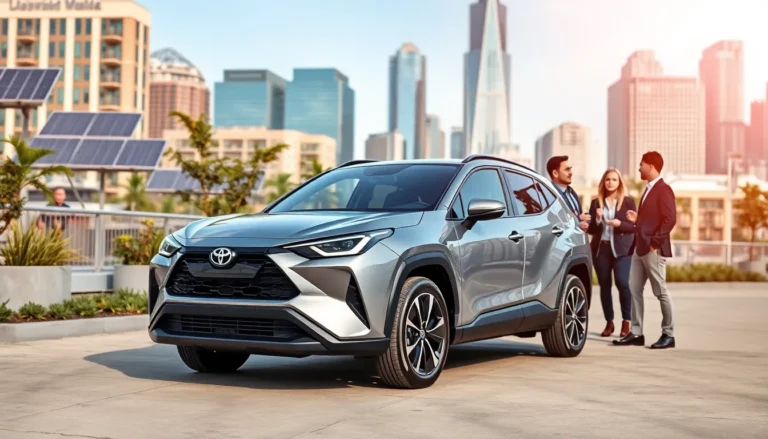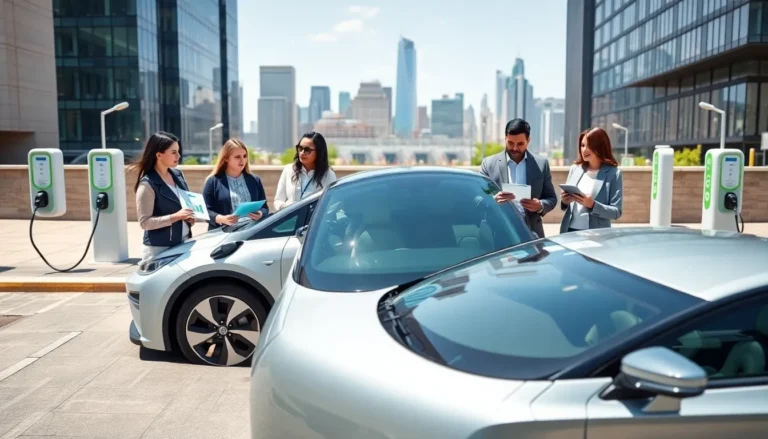Table of Contents
ToggleWith all the buzz around electric vehicles (EVs), one can’t help but wonder: are they really worth the investment? It’s like the proverbial apple of technology’s eye, everyone wants a slice, but is it the juicy treat everyone claims it to be? In this text, we’ll dig into the nitty-gritty of electric vehicles, balancing the pros, cons, and everything in between. Get ready for a ride down the road of eco-friendliness, cost savings, and just a dash of humor along the way.
Understanding Electric Vehicles

Electric vehicles have come a long way since their humble beginnings. Just a couple of decades ago, the idea of cars running solely on electricity seemed more like a sci-fi dream than a practical reality. Fast forward to today, and we see a booming market filled with various options that cater to different needs and preferences.
At their core, electric vehicles are cars powered by one or more electric motors, using energy typically stored in rechargeable batteries. While some people still hold onto the image of electric cars as slow, boxy contraptions, the modern EV lineup includes sleek models that can out-accelerate many gas-powered sports cars.
But how do they really work? Unlike traditional gasoline engines, EVs convert electricity into motion efficiently. Tesla, Nissan, and Chevrolet are just a few names that have changed the landscape with their innovative technology. Picture this: you come home, plug in your car akin to charging your smartphone, then wake up to a fully charged vehicle, ready for your commute. It’s this simplicity and convenience that have drawn many newcomers to the electric side of the automotive world.
Benefits of Electric Vehicles
So what’s the big deal about electric vehicles? Let’s break down some of the most compelling benefits.
- Cost Savings: Sure, the upfront cost can be a stumbling block, but many owners find that savings on fuel and maintenance quickly add up. Think about it: the price of electricity is generally lower than gas prices, and electric motors have fewer moving parts, meaning less wear and tear.
- Tax Incentives: In many regions, the government offers substantial tax credits for purchasing electric vehicles. This can dramatically lessen the financial burden and make EV ownership more appealing.
- Performance: Many electric vehicles boast impressive acceleration and instant torque. Check out a Tesla Model 3 if you want a taste of speed that would make a sports car jealous.
- Quiet and Smooth Ride: Electric vehicles operate nearly silently and smoothly. Gone are the days of sputtering engines and vibrations.
- Reduced Dependence on Fossil Fuels: With climate change becoming an increasingly pressing issue, EV ownership plays a role in reducing reliance on harmful fossil fuels.
Cost Analysis of Electric Vehicles
Now, let’s talk numbers. Electric vehicles may come with a higher price tag than their gas-powered counterparts, but a thorough cost analysis reveals that they could be economical in the long run.
Initial costs fluctuate based on the model and make, with EVs generally ranging from $30,000 to $100,000 or more. But, state and federal incentives can significantly reduce these numbers. For instance, a federal tax credit can take up to $7,500 off the purchase price.
Then there’s maintenance. Traditional vehicles with combustion engines require oil changes, fuel filters, spark plugs, and timing belts. An electric vehicle typically doesn’t need any of that, just a simple check of the brakes and tires.
Fuel costs further tip the scales. A study shows that the average cost per mile for an electric vehicle is around $0.03, compared to $0.13 for gasoline cars. Translation? If you drive a lot, that savings can stack up beautifully over time.
Environmental Impact of Electric Vehicles
Electric vehicles have been hailed as eco-friendly alternatives to gas guzzlers. But what’s the real environmental impact?
To put it bluntly, EVs can reduce greenhouse gas emissions significantly. According to research, a fully electric vehicle’s lifetime emissions can be substantially lower than those of a traditional vehicle, even if the electricity used to charge it comes from fossil fuels. Factors like the battery production process add to the complexity, but as renewable energy becomes more common, the overall footprint of electric vehicles will likely continue to shrink.
It’s also worth noting that as battery technology advances, recycling methods improve. This means fewer harmful materials end up in landfills, definitely a win for Mother Nature.
Challenges and Considerations
But, it wouldn’t be fair to paint a perfect picture without acknowledging some challenges.
- Range Anxiety: Many potential buyers worry about the driving range on a single charge. Most newer models offer ranges between 200 to 400 miles, but how often do those numbers line up with daily needs?
- Charging Infrastructure: While public charging stations are on the rise, they’re not ubiquitous. Some regions are still lagging in providing sufficient infrastructure for EV owners.
- Initial Costs: Even though ongoing government incentives, the purchase price remains a hurdle for many. But, trends suggest these prices might drop as technology advances.
- Battery Issues: The longevity and replacement cost of EV batteries can be concerning. But, many manufacturers now offer warranties that cover battery performance and degradation for up to eight years.
It’s essential to evaluate these factors against individual needs and lifestyles.
Future of Electric Vehicles
The future of electric vehicles appears bright, and reserves some surprises. With increasing commitment from automakers to transition to electric, experts predict that by 2030, a significant percentage of new cars sold will be electric. Innovations in battery technologies, like solid-state batteries, promise longer ranges, quicker charging times, and lower costs. These advancements could remove some of the current barriers holding back wider adoption.
Also, government policies worldwide are shifting toward promoting electric vehicles, with some countries aiming for a complete ban on new gasoline cars within the next couple of decades. This could usher in a paradigm shift, encouraging even more consumers to consider the electric option.
In short, the landscape of automobile technology is transforming, creating exciting possibilities for electric vehicles.







